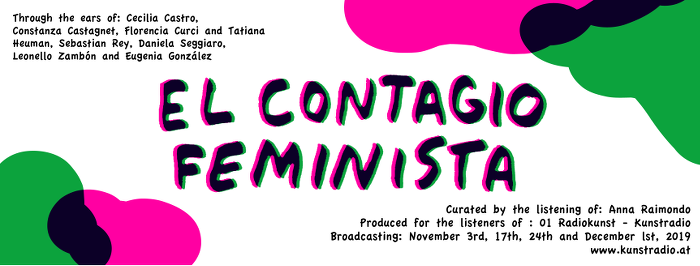

ABSTRACT
El contagio feminista – curated by Anna Raimondo
I have worked in Buenos Aires on three occasions over the last two years and experienced each time its street feminism. The word « feminism » seems to infiltrate daily conversations from coffee shops to taxis, from supermarkets to elevators. One day, while walking down the street, I saw a public workers notice about women safety: “Workers won’t whistle nor harass women in the street”. For the first time I thought of feminism as a form of social contagion. This contagion could be called « Marea Verde » (Green Tide), in reference to the feminist claims for legal abortion voiced by the massive demonstrations taking place in Argentina today. Since the start of the campaign in 2017, the feminist movement has adopted a distinctive symbol: a green handkerchief. Beyond the demonstrations, it is worn today as a token of our own feminism, as a call to solidarity. This plural feminism permeates the streets, conversations, dreams, hopes, and political agendas, compelling us to confront sexist violence in all of its forms. In spite of the ongoing process of deep cultural and social transformation, Argentina still has not legalized abortion yet and according to 2019 police and judicial reports, a woman dies of feminicide each 36 hours.
Today, the feminist movement in Argentina is called Ni una menos (Not one less). It emerged in its current form in 2015 and soon spread across several Latin American countries and internationally. Regular demonstrations are held to protest against acts of femicide and promote debates on topics such as gender roles, sexual harassment, gender pay gap, sexual objectification, legality of abortion, sex workers' rights, and transgender rights. Since then, Ni Una Menos has grown into a powerful international women’s movement that describes itself as « a collective cry against gender violence » (1)
The mouvement Ni una menos generates a time-space in which to listen and produce listening. The feminist production of listening in Buenos Aires promotes the identification of common claims without sacrificing the value of multiplicity and possible dissent, it claims the right to « agree to disagree »(2). It generates many possibilities and questions, « involving the openness of being this or that, beyond the cognitive security» (3). It became an epistemological storm, a transgression which has made visible and audible the limits of the patriarchal’s limits (4). To me, this active form of listening has turned feminism into a public contagion. Now, if this contagion has the color of a green tide, I wonder if we can focus on its sonic dimension and possibly activate a meta-listening of the radical transformation, embodied by the plurality of feminisms in Buenos Aires. To this end, I have invited a group of Argentinian sound artists to interpret the idea of feminism as a social contagion.
(1) http://niunamenos.org.ar/category/manifiestos/
(2) Bickford, Susan, 1966, Listening, conflict, and Citizenship. The dissonance of democracy, New York: Cornell University, p.4
(3) Corradi, Fiumara, Gemma, 1996,The other side of language. A philosophy of language, New York: Routledge, pp 32-33
(4) Foucault, Michel, 1977, Language, counter-memory, practice. Selected essayes and interviews by Michel Foucault, edited by Donald F. Bouchard, New York: Cornell University press
Anna Raimondo